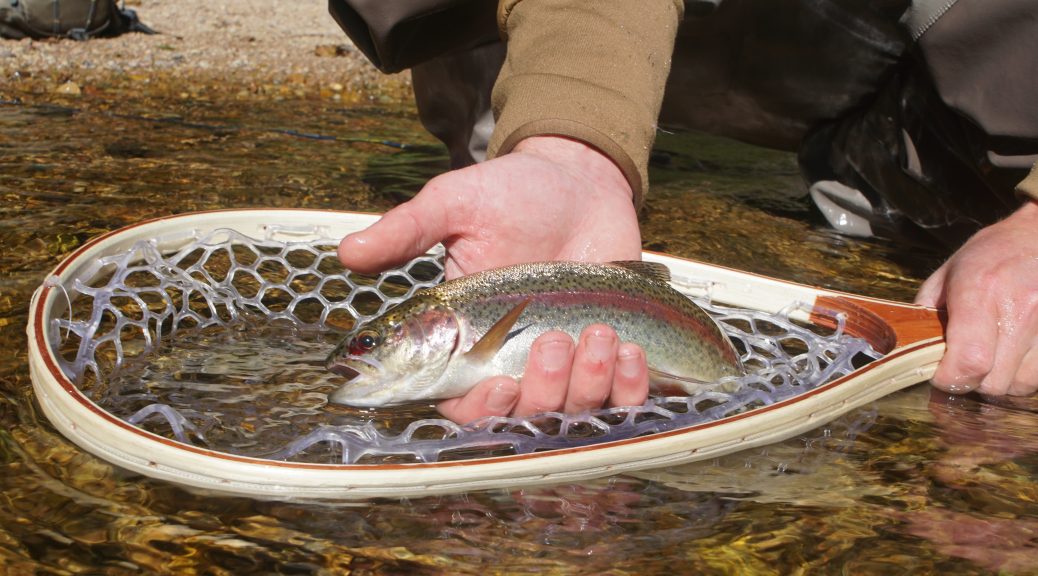
Fly-Fishing Ethics: Is Catch and Release Cruel?
There is many, many benefits to catch and release angling. I have always condoned it, primarily as a way to ensure healthy stocks of trout and continued angling opportunities moving into the uncertain future. In todays world, there are too many anglers for the amount of healthy, sustainable trout populations- hence, C & R has gained traction as the most ‘ethical’ approach to fly-fishing, and for the most part, I support that notion. In recent years, however, I have begun to question this approach. I have found myself critically examining the ethics of fly-fishing, and this process has aroused some troubling revelations about the sport and my relationship with it. In this article, I will examine the ethics of fly-fishing, and pose a simple question- is catch and release truly the most ethical method of fishing?
Now, without turning this into a philosophy dissertation, let just briefly discuss what ‘Ethics’ are anyways. Ethic’s are basically a collection of morals, which individually are judgements of right or wrong. They extend beyond yourself and into the community that surrounds you- essentially, they are an agreed upon code amongst society that holds participants to some minimum standard of goodness. Now here is the key point; ethics involve some amount of self-sacrifice. That is, we must be willing to give something up, because we acknowledge that we would want others to do the same if the situation was reversed. For example, if you eat a chocolate bar, what do you do with the wrapper? A person with good ethics would sacrifice a few seconds of their time to find a garbage can for the wrapper. It would be easier to litter, but they know that if everyone littered all the time, it would be worse for everyone overall. That is an example of an ethical decision (and one that most members of society can agree upon). The ethics of fly-fishing, however, can get a bit murkier.
This past summer, I found myself considering these ethical dilemmas on the river quite frequently. I started questioning actions I had never questioned before, questions like “Is it weird that I am puncturing the face of a wild animal, forcefully removing it from its environment, stressing it out while slowly suffocating it, then casually throwing it back into the river like nothing happened?” I thought about this in the context of other wild animals. Imagine if duck hunters were catch and release…. Shooting ducks from the sky with a grapple, injuring them, handling them, and taking pictures with them. Seems slightly inhumane. In fact, in the context of most other animals, the idea of purposefully injuring an animal for no other reason other than personal enjoyment seems rather… sinister. So why has it become so normalized in fly-fishing?
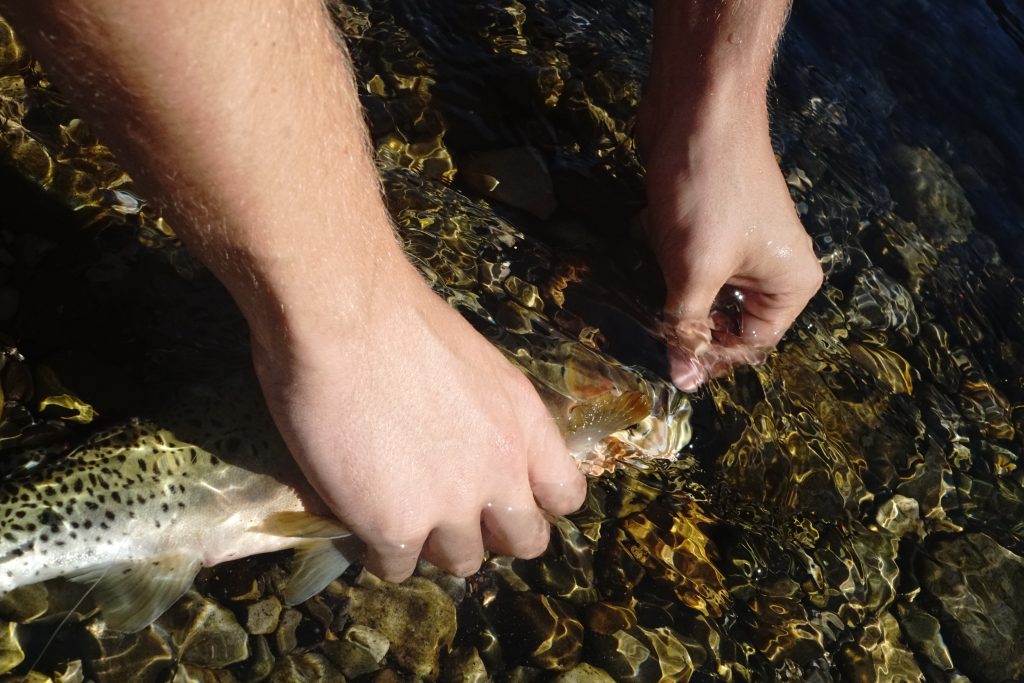
Typically when sportsmen and women pursue wild animals, it is fatal for the subject. They may suffer briefly, but die quickly. They are then honored by being turned into food, ultimately adding value to peoples lives. This is also the historical norm for fishing; throughout history, it was typically for sustenance. It just so happened it was also pretty fun.
Now, for many people, it’s only about fun. Yet in our selfish pursuit of fun, have we forgotten the ethical obligations we owe to other creatures? The more I considered this, the more it gnawed at me. In fact, the more I have this conversation with non-anglers, the more sure I am that C & R is definitely not ethical. In many peoples eyes, C & R is nothing short of animal cruelty. So what is it about angling that has led to this collective ethical blind spot?
At the very least, I want this post to spark some reflection in readers. Personally, I found this reflection very helpful in reframing my relationship with fly-fishing. When rationalizing my fish torture to others, I usually find myself reverently describing that special, intimate moment of handling a beautiful, living creature in its natural environment. Most of the time, we see wildlife from afar, or dead. Fishing is this rare medium where we get to physically connect with a living animal, and this connection can be very powerful. For some, it may inspire them to become a conservationist; for others, it may inspire them to pursue art, or photography. For many, it is a link that makes the natural world tangible; something that can be held, not just seen. Therefore, I do think there is an ‘ethical’ component to fishing- for some of us, fishing makes us better people. It makes us care about nature, and stand up for it when we must.
Elitism In Fly-Fishing
For many of us though, our pursuits can take a dark turn towards obsession. Although my obsession has tempered slightly as I grow older, the thrill of catching and pursuing fish is still highly addictive to me. I know there are many others out there just like me- in fact, I made this entire site for people like us. Yet, I have started to realize that this obsession is not sustainable. Nor is it fair to the fish that I say I care about. In my experience, those who are the most experienced, most passionate fly-anglers typically think they have the least impact on the fish; when in fact the opposite is true. Its time for all of us to accept the fact that WE are one of the main problems affecting our native trout, and start making good on our side of the ethical bargain by making more sacrifices.
As some of you may know, I spent the past summer working in the Upper Oldman area everyday, conducting fish surveys throughout the watershed, encountering many anglers in the process. One such encounter really sticks out, and it just so happens to prove my point. We spent around 15 minutes chatting with an angler fishing on the Livingstone river. As always, his immediate concern was that we were about to electrofish the section he intended to fish. After we assured him we were going well away from him, he eased slightly and began divulging information about his fishing prowess, and complaining; about regulations, governments, RV campers, and the spin casters. This gentleman told us he has spent the previous three weeks in the Upper Oldman, mostly on the Livingstone. He told us he fished everyday, and that the fishing had been outstanding. He told us he had averaged over 30 fish a day, and in total had caught probably 400 fish or more during his trip. He then proceeding to rant about how all the fish had hooking damage, and how the “spin-casters, oriental families, and families with kids who come camping once a year” were entirely to blame. We were glad to be rid of him when we finally parted, but his perspective left us scratching our heads. This dude had fished the same system for three straight weeks, catching 400 fish in the process, and yet was blaming families who came fishing once a year for all the hooking damage?
This is the mindset I am talking about that really needs to change. The “everybody else’s fault but my own” mentality. I hate to break it to you, but the hooking damage to fish in the Oldman is from FLY-FISHERMAN. The reason it is so bad is because the area is heavily overfished. If you are fishing there, you are the issue. The sooner we stop pointing the finger at others, the sooner we realize that we must make sacrifices if we want something to change. If you don’t want fish with damaged faces, don’t go fish at the Gap. If you don’t want to have any impact, then stop fly-fishing.
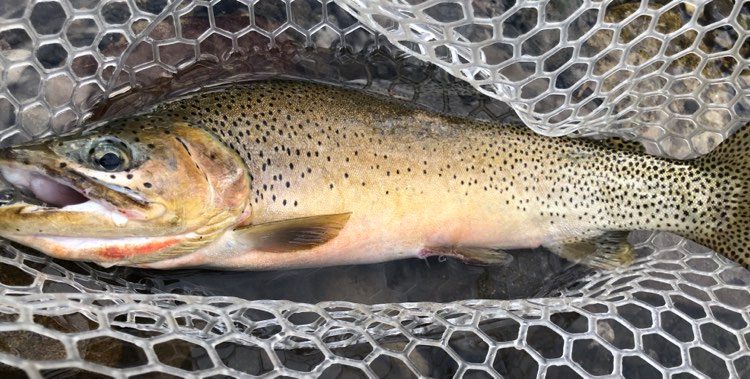
This is not a debate about whether fish feel pain or not. That is irrelevant to the conversation. Regardless of whether the experience of being hooked and released is painful or not to trout, it is undoubtedly intrusive and in many cases, harmful. It creates stress, uses up energy reserves, changes feeding habits, damages tissues, and can leave the creature vulnerable to disease. Anglers can be the main source of invasive plants and parasites establishing in new waterways. Wading can cause damage to redds and destroy eggs. We often leave garbage, whether by accident or on purpose. Our presence is not a positive force for the overall health and wellness of these ecosystems. I think it’s important to remember this when planning our pursuits, and when possible, try to take actions that minimize or mitigate this impact. This is what I would call “Ethical Fly-Fishing,” and its never been more important than now that we adopt this mindset.
What does ethical Fly-Fishing look like?
This is the question I have been trying to answer every since this topic popped into my mind. I love fly-fishing, and I don’t intend on stopping. Yet, as a biologist and conservationist, I have started to realize just how profound an impact someone like me can have. This past summer, I started to reframe my fishing experience, and tried to spend my time on the river in a way that would minimize my impact.
Go fishing less. Damn, that’s some tough advice to give, but unfortunately, its probably the best way to be more ethical. I fished much less this summer compared to others, and instead focused on making the more limited time on the water even better. In the past, I have been guilty of over doing it, and this summer, I really enjoyed the days I got even more because I made the conscious choice to go less. Especially during the busiest, hottest part of the year (ie. late summer) consider taking a few weekends off and returning to the river in the fall once temps have dropped and their is less crowds.
Get off the beaten path. Getting into a remote setting can be an excellent way to minimize the impacts of C & R. In many of Alberta’s overfished systems, it is probably the sheer amount of hooking events that has the most effect as opposed to any individual event. Fishing in places that do not see much traffic, and fishing for trout who have maybe never been hooked is not only more fun, but it lessens the overall impact from your catch and release. Alberta’s most popular streams are over-run with anglers- think outside the box and try fishing somewhere you haven’t heard much about. You might be rewarded!
Focus on the experience, not the number of fish you catch. This was probably the biggest shift in my mindset last year, and it 100 % improved my experience on the river. Often I would walk past areas I knew had lots of fish- I knew cause I had caught fish there before. So instead of recreating an experience I had already had, I elected to continue walking, and find somewhere new where I could have a novel experience. Instead of focusing on how many, I tried to really focus on the experience on the whole. Not what I caught, but how I caught it, where I caught it, what made it special. This made it easier to walk away feeling successful, even if I had only caught 1 or 2 fish.
Acknowledge that Fly-Fishing is a selfish pursuit. Admit it. Fly fishing is selfish. You are exploiting a natural resource for personal gain. Don’t play it off as an act of righteousness, or pretend it’s any different than other forms of fishing. It OK to pursue things that make you happy, but there is a point where the pursuit of selfish things starts to give diminishing returns.
Do everything to minimize your impact… Every time. This is all the stuff we talk about on this site all the time…. Pinch your bards, practice proper fish handling, don’t fish when its too hot, disinfect your wading boots between different rivers, ect. In my experience, most people know they should do this stuff, but often don’t because they didn’t plan ahead or prepare. At the beginning of the season, make sure you have all the things you will need, like a net, forceps, pliers. Put together a disinfection kit that lives in your car. Make it easy for yourself to do the right thing. And most importantly, treat every fish with the respect and care all living animals deserve.

I don’t want these tips to come across as virtue signaling. I want to make it clear that this post is me acknowledging my impact. I am expressing remorse about the unethical things I have done in pursuit of trout. The reason for me sharing these tips is because they genuinely made my experiences on the river so much better, and they made me feel better about my day when it was all said and done. If this sport is to continue growing in popularity, we need to grow the ethics associated with it and ensure people who fish realize they have responsibilities to others, and the fish. Fly-fishing is not a right; it is a privilege.
In light of all of this, I have started to relate more to anglers who prefer to keep their trout. I am a big believer that fish are an excellent food resource, adding food security to our landscape and nourishing those willing to put in the time. When managed properly, that food source is sustainable, renewable, and carbon-neutral. The most ethical thing that all of us – including government officials, anglers, and biologists- should work towards is having healthy, sustainable populations of trout that can handle fish harvesting and still be viable. Ultimately, that is when fish have the greatest value- as a food source, a recreational pursuit, and a critical part of an ecosystem. Then, people can make the choice for themselves which method of fishing is most ethical- C & R, or harvesting- or whether the only ethical thing to do is give up fishing altogether.
I’ll let you all make that decision for yourself. But I hope this article has prompted some reflection into ways you can contribute to the ethics of fly-fishing, and be part of a growing community of anglers willing to make sacrifices to to ensure our ecosystems continued health.
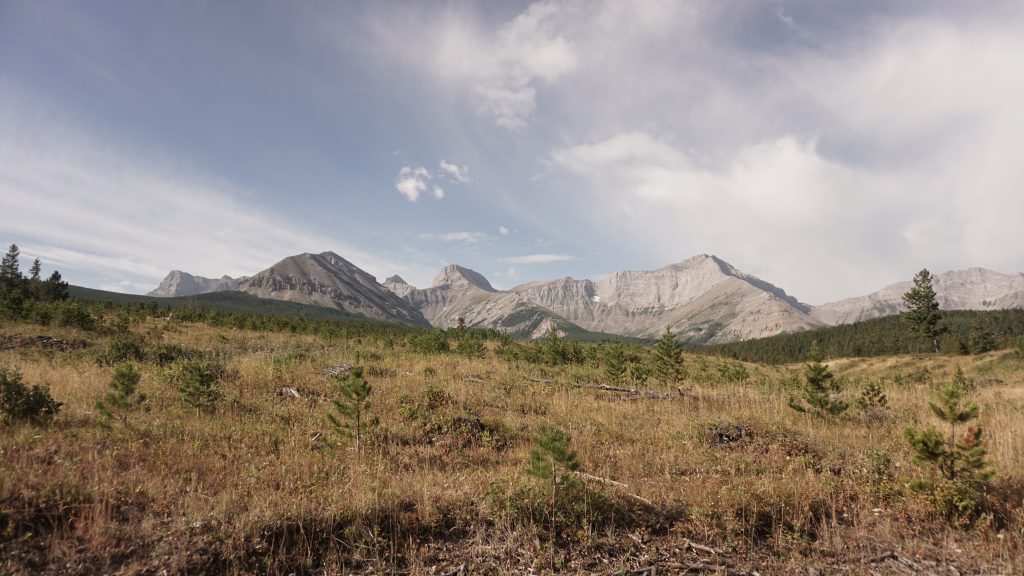


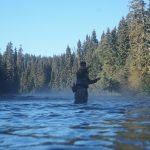
22 thoughts on “Fly-Fishing Ethics: Is Catch and Release Cruel?”
Food for thought . Barbless .
I always condone barbless hooks at all times
Electro shocking harms the fish as well. We see fish with burned out gill plates. There was never a issue before.
Hey Mike, you are 100 % right. Electrofishing has been the go-to method for fish research for decades now, but if falling out of favour for less invasive methods such as eDNA. It is most certainly very invasive and more harmful then fly fishing. The Upper Oldman has been the site of a 5 year population assessment survey conducted by ACA; I worked on this crew last year, and we sampled over 2000 fish electrofishing. Over the 5 years that likely around 10,000 captures. That is pretty intensive electrofishing effort, and it doesnt suprise me if electrofishing injuries are being observed. Luckily, that project is now complete so the fish in those reaches will get a break. Hopefully the government officials put that data to good use, but I agree with you that electrofishing can be very damaging.
What an wonderful article! Insightful, important and above all honest and sincere. The more I have thought about it, the clearer it became to me there was only one conclusion: give up fishing altogether. Which I reluctantly did four years ago now – and it still feels good. I have discovered so many other ways to enjoy nature, rivers, wildlife, fish. Now this was my decision, I have no judgement about others, everyone should figure out for themselves and that is perfectly fine.
Hey Jack, thanks so much for your feedback I’m glad you enjoyed the perspective. I have to admit that I have had the same considerations- it’s tough for me because fly-fishing is one of the funnest things there is, and has given me so much over my life, including helping me find my identity and career. It’s an ethical dilemma, and one I’m glad i’ve started to ponder…. one day I will probably give it up as well, but i am so grateful for what t has given me. Cheers
Thank you for writing this article and it’s nice knowing other flyfisher people have pondered theses thoughts. I love flyfishing and the fish themselves. My way around all of this. I have cut my hooks completely off. Now I just watch them follow my fly or feel the tug and smile knowing they are swimming happily on their way.
Hi Janice, thanks for your comment I’m glad you enjoyed. And No Way! I also discovered that method…. accidentally, i’ll admit. I couldnt figure out why they all kept getting away until I went to change my fly and there was no hook! However, this is a method i still enjoy using, particularily on small mountain creeks with small fish. You still get the take and the tug but never have to worry about fussing around getting hooks out of mouths.
This was a great read. I think many of us feel this exact way and you put it into words that I resonate with. It is a selfish sport and I tried to justify it to everyone around me. Once you accept it for what it is, you become wiser. I made the decision to only fish when it’s a flourishing fishery I can harvest from. I have no issues harvesting fish for food as long as the environment is not suffering, population wise. I do like eating fish, so I can still enjoy the process with respect for what the water gives us. Plus, Swimming in a river with a beer nearby gives me that same happiness c&r fly fishing has given me.
Hey Chris, thanks for the comment and glad the article resonated. There are so many ways to enjoy the river, and they don’t have to be be damaging. Snorkeling is another way to experience the fish in a less intrusive way, would highly recommend!
Thankyou for the thoughtful article I have often wrestled with these same thoughts and concerns.
I guess first off what the hell is that guy tying on to catch 30 fish a day haha. Garlic and kool-aid flavored chicken guts? Full disclosure I struggled to one catch fish some days when I was out at Livingstone this year, throwing size 22 caddis straight upstream lol. Perhaps that is telling of the excessive pressure from overfishing and drought. Here’s hoping the snow pack improves this year and the little trouts can cool down.
When it comes to the ethics of fishing I was under the impression that fish do not have an advanced brain neocortex and so do not feel the suffering associated with pain, more so a knee jerk reaction from the pain stimulus. I was also under the belief that most fish survive catch and release if handled properly even with tackle lodged in the throat. Maybe there is newer info out there to be aware of.
I guess I feel confident in my lack of ecological impact because of how much of a scrub I am averaging like 0.7 fish a day lol but I will be changing out all my hooks, moving up to stronger line to minimize the fight time and using a dehooker tool for quick release. I would also support pay-to-play access on Livingstone and other critical rivers in Alberta if it means other generations can enjoy fly fishing too.
Hey Steve, thanks for you reply.
My opinion is that it is irrelavent whether fish feel pain or not… Us hooking them is a negative factor for them. How substantial these negative impacts will be really depends on the fishery. Catch and release mortality usually is quite low (around 1 %) but this number can increase substantially in certain conditions.
And no doubt, your impact really depends on your success. Catching less fish is for sure a way to limit your impact (It’s how i’ve limited my impact on coastal steelhead rivers ;)).
I appreciate your feedback, and it’s awesome to hear about all the things you are doing to limit your impact. Kudos to you.
Hello, i am writing from France, so firtsly, sorry for my bad english. Thank you for this relevant article. It help me to try to resolve this paradox that prevent me to sleeping : why do i have to disturb fish by catching them, while i could only enjoy to admire them as i admire animals in the forest ?
It is cool to see that other fishers are thinking about this issue. In my area, fly fishers are only focused on the question of suffering, trying to find arguments to say not.
But as you wrote, it is not the problem.
I agree with your reflexion, arguments and solution. I never did 100% no kill but more and more, i kill more fish for eating. Contemporaries philosophers working on relations between human and “nature” could help us too, in my opinion. I am trying to read it but it is not easy. The concept of ecocentrism, by Leopold, is interesting. I am not sure but it could partially justify no kill (?). Indeed, if the important is the biotic community and not the individuals, no kill is better than kill (?). And, we may see fishing as an alliance, a “contract” whith the ecosystem : “OK, fishers have a little impact on their ecosystems, they hurt some fish. But reciprocally, they must be considerate towards the ecosystem, they have to be commited to defend it”. The strenght of this “contract” is that it could be signed by a lot of citizens, because fly fishing is playful and attractive. But the problem is that in my opinion, this reciprocity is too weak. In France, naturalists are more commited, realise more concrete actions while they don’t depend of this system of reciprocity.
I am not sure my talk is understandable, sorry, it is not easy to explain, especially in english !
Hi Gael! I also replied to you email… but to add the the general discourse on this page… I love your concept of a “contract” that we as fisherman engage in. It’s definitely up to us to uphold the ethics of the sport and be reciprocal towards nature (as our enjoyment is proof enough that it provides for us).
Anyways, I’m glad you enjoyed the article and thanks so much for sharing your perspective.
I gave up fly fishing for a spinner reel when I realized how much time it took and the damage being done to the fish. I don’t have all the advantages of a fly anymore but then again it doesn’t take 10 minutes to reel a fish in. I see fly fisherman playing with the fish as much as they can getting every ounce of energy out of the fish as possible the pole goes way up in the air and they romanticize about how wonderful what their doing is and God must be them and the whole nine yards. I couldn’t agree with the author anymore fly fisherman suck balls I didn’t read anything negative about spinning rods. That’s because my process and a flymans process r completely different my trout suffer as little as possible since they r managed very very quickly not 10 minutes. Besides since when do fly fisherman need 4 flies 4 hooks on one line? How’s that ethical hooking fish instead of catching fish and u all no what I’m talking about. My friend rarely has a “true” catch in the mouth usually “one” of his many hooks catch the fish in the side. Have u ever just sat and watched a flyman baby his $2000 dollar rod complain that his $600 waiters have a hole in them didn’t catch anything even though his pathetic fly fishing website where like minds collide said he would? Anyway your dirty looks and comments have gotten to me on my river and the first fly fisherman that gives me grief this year is going to regret it big-time.
Hey man, appreciate you taking time to comment… but i think you might have missed the point. I’m not trying to belittle or invalidate any one group here.. the point is to hopefully raise the ethics of all fisherman, gear or fly. Seems like you have had some bad experiences with fly fishers, which is too bad. However, many fly-fisherman have had bad expereinces with gear fisherman… it goes both ways. You coming on here and bashing all fly-fisherman is inconsiderate and not helpful. I agree with some of what you are sayin, but please keep the comments respectful or I will delete them in the future.
Great Article, As a fisherman and guide for over 30 years. Making a living at fishing and fly fishing in particular. This article hits home. There is no question fish feel pain there fighting for there life. C&R is selfish for sure to get a great picture at the expense of the fish. I believe more fish die even with proper handling than fly fishermen want to admit. I use to watch rainbows float by in alaska all day long on different rivers just to get the glory shot. I am really starting to respect the gear fishermen more, get your fish or limit and get off the water. I remember one day on the Kanektok river in alaska. A native fellow watched me fly fish and practice C & R and all the fish appeared to swim away unharmed. He later said I was harassing the fish and told me kill as many as you need for you and your family but then get off the water and leave the fish alone till next time. Words I will never forget, makes total truth, I am starting to think C&R fishing is wrong.
Thanks for the comment, and for sharing your experiences with these thoughts. It’s been amazing to see how many others relate. People bring diff. worldviews to this sport and i think the process of considering and trying to understand others perspective is hugely important. What is wrong in 1 context might be right in another, which is why it’s important to critically think and question the norms you hold. Thanks again for your comment!
I loathe catch and release fishermen. The elitists even more. They have made it an ideology instead of a viable skill that is ALSO a pastime. I hunt and fish to eat my kill not make the animal suffer. One fish for the family per time out, which is rare in this economy to do regularly as well.
I loved this article and found the thought process, tips and comments to be incredibly helpful. The ethics of fly fishing has been a topic that has tugged at the back of my mind for years as a fly fisher. This helped me a lot in addressing those feelings and making a conscious effort to honor them, the fish and nature at large. Thank you for sharing your thoughts!
I found this article exploring to see if my evolution as a fisherman was unique. Over a lifetime I amassed a huge fishing library and tons of freshwater, surfcasting, and fly gear. I even had specialized kits to pursue carp and smallmouth bass in rivers. I had passion. I loved it. Slowly, however, I couldn’t escape the feeling that all my C&R amounted to torturing living creatures for my pleasure and amusement. I studied the science regarding their small brains and ability (or not) to feel and remember pain. Ultimately, in the winter of 2025 I decided to leave the game and sell all of my gear. -M